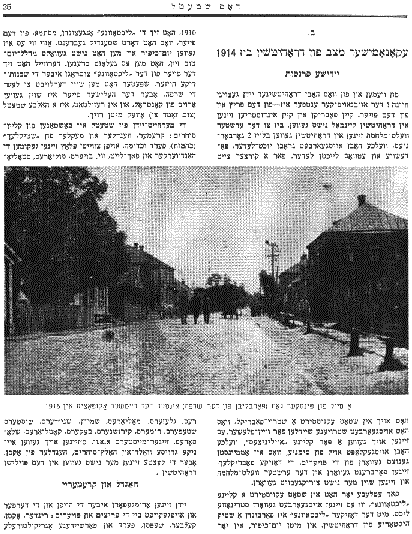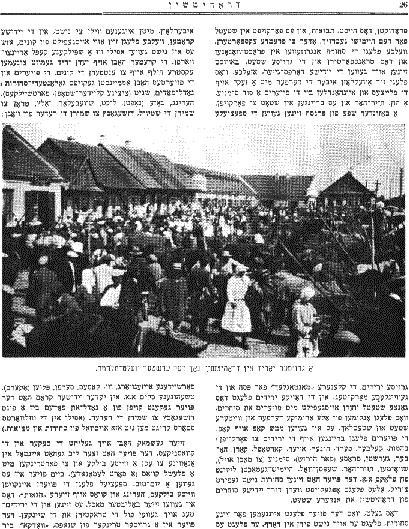 [
Page 25
]
[
Page 25
]
 [
Page 26
]
[
Page 26
]
products such as grain, and then sell it in town for local use, or sell it to
exporters, who loaded it on to freight wagons and transport it to the large
cities. Another well-known occupation was that of the village peddlers, who
used to travel through the villages carrying a sack, and who traded with the
peasants for a
pud
[36 lbs.] of seeds, a hen or pig hair, and then sell it in town.
[Photo:] A large trade fair in Drohitchin after World War I.
Another major source of
livelihood was during the large trade fairs, smaller Monday fairs before
Passover, and the usual market days. During the large fairs, the entire town
was filled with peasants and merchants, who came from the surrounding villages
and more distant towns and cities. People were tightly packed back to back. The
peasants would come to town to sell animals, calves, horses, hens, eggs,
potatoes, corn, oats, millet, barley, seeds (to make oil), mushrooms, pig hair,
sheep wool, home-made flax linen, etc. The peasants had nothing to take back
home; they sold off everything to Jewish merchants in Drohitchin and other
cities.
The peasants didn't take home
the money they made from their produce either, because they exchanged it in
Jewish stores, which they cleaned out of merchandise. At each fair, the stores
had to hire extra help to deal with the demand. The peasants bought up the
smallest household items: sewing thread, fabric for clothing, herring, heating
oil, candles, mushrooms, salt, fish oil for their boots and tar for their wagon
wheels. They also bought ironware such as scythes, sickles and plows and other
implements, etc. The peasant could find everything in any Jewish store, from
needles and threads to a pound of tar for greasing their wagon wheels. (You
could never even find such an assortment of merchandise and bargains in
Woolworth's stores.)
The bakers and tavern keepers
also enjoyed success. The peasants loved to sit down to eat a white bread roll
and drink a bottle of kvass (a type of lemonade). This was holiday time for the
peasants; they especially enjoyed buying white bread rolls, herring and kvass,
which they considered a very tasty combination, for their festivals. There were
many treats and gifts during those days; the peasants drank lots of whisky and
vodka, but not much beer.
JewishGen, Inc. makes no representations regarding the accuracy of
the translation. The reader may wish to refer to the original material
for verification.
JewishGen is not responsible for inaccuracies or omissions in the original work and cannot rewrite or edit the text to correct inaccuracies and/or omissions.
Our mission is to produce a translation of the original work and we cannot verify the accuracy of statements or alter facts cited.
 Drogichin, Belarus
Drogichin, Belarus
 Yizkor Book Project
Yizkor Book Project
 JewishGen Home Page
JewishGen Home Page
Copyright © 1999-2025 by JewishGen, Inc.
Updated 3 Dec 2001 by LA